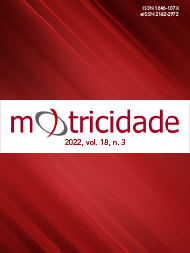Quantitative and qualitative analysis of an intervention with adapted motor games: Project "Jogamos tudo, Brincamos todos”
DOI:
https://doi.org/10.6063/motricidade.27088Keywords:
1st CEB, Games, Reverse Inclusion, Inclusion Attitudes, Perception of CompetenceAbstract
The present pilot project aims to analyse the effect of an intervention program based on ludic-motor games adapted for sensory and physical disabilities, lasting 5 weeks. The project is for children of the 1st and 4th grades of the 1st cycle of Basic Education and regards attitudes of inclusion and the perception of competencies. Thirty-two students, 15 male and 17 female, aged between 6 and 10 years old, participated in the present research. For the assessment of the implementation of this program of inverse inclusion, we used a mixed methodology with the quantitative assessment carried through a questionnaire (in the validation process) and the qualitative assessment with focus groups. The main results reveal significant differences in the perception of competence dimension between the two evaluation moments (pre and post). The analysis of the focus groups highlighted the satisfaction with the activities developed in the program as well as the perception of its relevance. In general, we concluded that the project allowed participants to be more aware of the skills and difficulties of a child with disabilities and more knowledgeable of strategies (for example, games and play) to include peers with disabilities.
Downloads
Published
Issue
Section
License
The authors of submitted manuscripts must transfer the full copyright to Journal Motricidade / Sílabas Didáticas Editions. Granting copyright permission allows the publication and dissemination of the article in printed or electronic formats, and copyrights start at the moment the manuscript is accepted for publication. It also allows Journal Motricidade to use and commercialise the article in terms of licensing, lending or selling its content to indexation/abstracts databases and other entities.
According to the terms of the Creative Commons licence, authors may reproduce a reasonable number of copies for personal or professional purposes, but without any economic gain. SHERPA/RoMEO allows authors to post a final digital copy (post-printing version) of the article on their websites or on their institutions' scientific repository.


